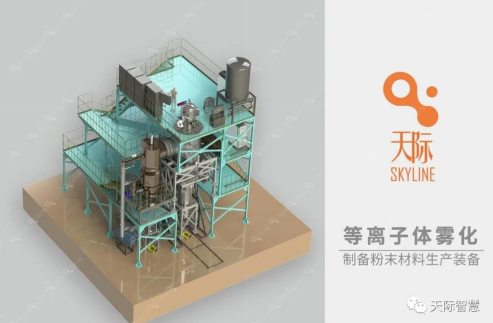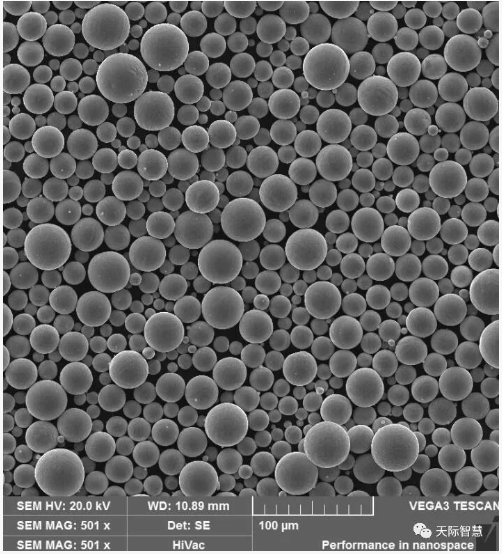Production of Spherical Titanium Alloy Powder for Additive Manufacturing—PA Technology
3D printed titanium alloy parts
Additive manufacturing (also known as 3D printing) technology is a forming technology that uses 3D printing equipment to stack raw materials layer by layer to manufacture parts. It is known as the core of the "third industrial revolution", in which metal parts are formed in the entire additive manufacturing technology system China is potential. Titanium alloys have received widespread attention and have been widely used due to their low density, high specific fracture toughness, good heat resistance, fatigue strength and crack growth resistance, toughness and corrosion resistance. Among them, Ti6Al4V alloy is an alloy that uses specific gravity in titanium alloys, and its usage has accounted for 75% to 85% of all titanium alloys. Many other titanium alloys can be regarded as modifications of Ti6Al4V alloys. Ti6Al4V alloy is α+β alloy with relatively stable structure and good toughness, plasticity and high temperature deformation properties. At present, the application of titanium alloys has been involved in many industries such as aerospace, automotive and medical. At present, there are mainly two methods for additive manufacturing of high-performance precision titanium alloy components: selective laser melting (SLM) and electron beam melting (EBM).

What are the requirements for titanium alloy powder of 3D printing?
The raw materials for additive manufacturing of titanium alloy parts are usually specially customized titanium alloy powders whose size, shape and shape have been precisely optimized. In the selective laser melting (SLM) additive manufacturing process of titanium alloy parts, spherical titanium alloy fine powder with a size of less than 53 microns is usually preferred. At the same time, hollow particles and powder agglomeration should be avoided to ensure good processing performance and product performance. The electron beam selective melting (EBM) additive manufacturing process selects spherical titanium alloy powder with a size in the range of 45 to 106 microns.
Plasma atomization powder production technology
Plasma Atomization (PA) is to feed metal raw materials (usually metal wires, see the figure below) at a certain rate through a special feeding mechanism, and focus plasma jets generated by multiple plasma torches installed symmetrically on the top of the furnace body Under the action, the raw materials are quickly dispersed into ultra-fine droplets or aerosols, and heat exchange with the inert gas for cooling during the deposition process, and solidify to obtain a nearly spherical powder.

Production of spherical titanium alloy powder by plasma atomization
Using plasma atomization technology, titanium alloy powder with small particle size, high purity and good fluidity can be obtained. Compared with traditional pulverization technology, plasma atomization pulverization technology does not use the commonly used water or gas medium flow to smash the liquid flow, but uses thermal plasma, which can avoid the low sphericity caused by the rapid cooling of the molten droplets. The problem. In addition, this method does not require the use of traditional ceramic crucibles, and is suitable for powdering all metal materials that can be melted, especially high-reactive metal materials containing titanium that pollute the crucible.

The plasma atomization powder material production equipment independently developed by SKYLINE has the following advantages for production of metal powder:
1.Equipped with a combined modular multi-functional raw material conveying device, including liquid, gas, and powder raw materials uniform and precise feeding device, filamentous raw material uniform and precise feeding device, block vacuum melting precise flow limiting and diversion pouring device; it can meet different conditions Raw material production;
2.It is possible to precisely control the particle size, oxygen content and fluidity of the metal powder by changing the feed rate of the metal raw materials, the inlet gas pressure and other parameters; it is possible to prepare nano-level powder materials;
3.Its professionally designed chemical reaction chamber can react to produce a variety of high-complexity, high-purity, multi-element powder materials;
4.In order to improve the efficiency of atomization and the stable progress of the atomization process, the equipment adopts ultra-high temperature plasma generator, through the selection of plasma gas type, and the reasonable matching of gas flow and metal flow rate, a full range of high-performance metal element and metal alloy are produced. Micron/nano powder materials can also be used for the preparation of multiphase compound powder materials, including: chemically active metals Mg/Al/Ti/Zr and alloys, etc.; high temperature metals W/Mo/Ti/Ta and alloys, etc.; oxides , Nitride materials, etc.
